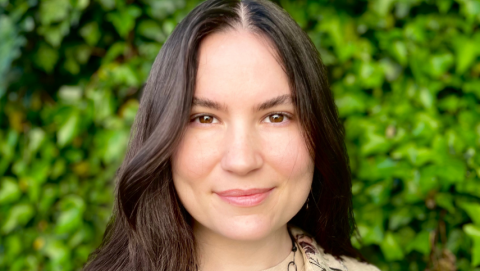Lehigh Doctoral Student Receives Two Graduate Student Awards

Maddie Tschauner, a third-year doctoral student in the Counseling Psychology program, will pursue a career that brings together science and advocacy.
Maddie Tschauner recently received two Lehigh Graduate Student Awards—the Graduate Student Leadership & Service Award and the Graduate Life Leadership Award. A third-year doctoral student in the Counseling Psychology program, the awards recognize her role in creating programs and resources for College of Education (COE) graduate students and reflect her commitment to civic life and social justice.
Her efforts have ranged from organizing a field trip to celebrate the Lunar New Year to leading student town hall sessions and co-managing the COE’s food pantry. Tschauner also serves on the Diversity Committee and as the graduate assistant for the Multicultural Resource Center.
Her leadership extends through her involvement with Lehigh’s Graduate Student Senate, where she has been an active participant for three years.
A native of Nebraska, Tschauner enrolled in the University of Redlands in Southern California for her undergraduate coursework. There, she was part of a program called the Johnson Center for integrative studies that “brings together bright, creative, independent and active students with a genuine interest in academic and civic pursuits.” After graduation, Tschauner knew she wanted to pursue a career in counseling psychology and her undergraduate advisor recommended Lehigh for her graduate degree.
“At Lehigh, our counseling psychology courses are all so thoughtfully designed to help us develop our counseling psychologist identity,” she says. That identity is part scientist, part practitioner and part advocate.
“To me, that’s what differentiates a counseling psychologist from a clinical psychologist,” she explained. “There's a commitment to social justice and looking at things from systems-level issues—taking into account the way people are experiencing their identity and their social locations and how that informs the problems they encounter and how change occurs.”
In a few weeks, Tschauner will head back to Southern California ,where she will intern in a clinical and forensic psychological services clinic.
“I really enjoy forensic psychology,” she said.
Forensic psychologists practice where the legal system and psychology intersect; for instance, using scientific methods and knowledge to inform court decisions, such as evaluating the likelihood of recidivism or need for various interventions.
“My advisor, Dr. Nic Johnson, believes assessment is an act of social justice, and I really believe it is. Often a system is asking questions about a person, and we have the opportunity as psychologists to advocate for them and provide treatment recommendations so that the person can receive the resources they need, whether it's individual or group therapy, substance use treatment, housing resources, etc.,” she said.
Long term, Tschauner sees herself working in a rehabilitative setting, such as a prison or the Veterans Administration and continuing research on how plant medicines, such as psychedelics alongside therapy, can support survivors of sexual assault.